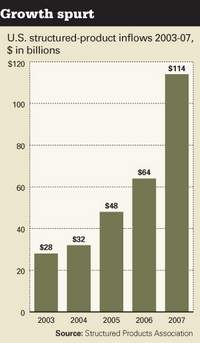Five leading trade associations, co-sponsors of the Joint Associations Committee (JAC), today released “Structured Products: Principles for Managing the Distributor-Individual Investor Relationship.” The global, non-binding Principles address a wide range of issues affecting distribution of retail structured products to individual investors.
The Principles complement the JAC’s “Principles for Managing the Provider-Distributor Relationship,” which were released in July 2007. The Associations issued the Principles for public comment on May 12 and are today publishing them in final form.
"The second set of JAC Principles represents many months of thorough memberdiscussion and wider syndication, and articulates the values that market participants share as they promote the continued development of a healthy market in retail structured products,” said JAC’s Chairman, Timothy Hailes, Managing Director and Associate General Counsel at JP Morgan Chase in London.
“As with the July 2007 Provider-Distributor Principles, the key will be intelligent and proportionate application to local regimes."
The JAC comprises the following trade associations: European Securitisation Forum (ESF), International Capital Market Association (ICMA), London Investment Banking Association (LIBA), the International Swaps and Derivatives Association (ISDA®) and Securities Industry and Financial Markets Association (SIFMA).
The principles were based on extensive work and collaboration with the associations’ member firms, and on consultation with distributor associations.
The Principles can be accessed by clicking here.
Thursday, July 10, 2008
Bloomberg: Bridgewater predicts $1.6 trillion in subprime losses
Bridgewater Associates has warned of a massive $1,600bn (€1,020bn) of banking losses from the global credit crunch, four times official projections, according to a report in Swiss newspaper SonntagsZeitung.
The US hedge fund said true losses would swell if banks were forced to adopt "mark-to-market" methods of valuing structured credit instead of the "mark-to-model" currently being used.
“We are facing an avalanche of bad assets. We have big doubts as to whether financial institutions will be able to obtain enough new capital to cover their losses. The credit crisis is going to get worse," Bridgewater was quoted as saying the report.
UK: Wealth advisers and private banks turn to structured products
Wealth advisers are increasingly turning to structured products in an effort to protect clients from stormy markets while offering the potential for capital growth, according to the chief executive of Blue Sky Asset Management, a UK-based structured products specialist set up last year.
Blue Sky is launching a third issue of its Asset Allocation Accelerated Growth Plan, which enables investors to construct their own portfolio split between UK, US, European and Japanese equity markets, while receiving capital protection and leveraged returns.
Chris Taylor, chief executive, said: "We are laying down the gauntlet to the traditional mutual fund and index tracker world. We think the features of the plan question the rationale for investing in those products."
He pointed out that traditional mutual funds had haemorraged assets in the first quarter in the both the UK and US, while demand for cautiously managed and structured products had been robust. "Investors are voting with their feet, and walking out of traditional mutual funds into structured investments that can alter the risk and return profile of their portfolio."
While the firm is focussing its efforts on high-end intermediaries, which are increasingly targeting high net worth investors, it is also seeing interest from private banks.
Taylor said it recently structured a sophisticated product based on a distressed debt hedge fund which was being sold by a Swiss private bank. "We are seeing interest from the more open-minded private banks which are prepared to talk to an independent provider," he added.
Blue Sky is increasingly building inflation protection into its structures. "While a lot of people are talking about how to structure portfolios to hedge against rising inflation, we think there is no better protection that a direct link to the retail price index. It doesn't get much cleaner than that," said Taylor.
For the original article in Wealth Bulletin, click here.
Blue Sky is launching a third issue of its Asset Allocation Accelerated Growth Plan, which enables investors to construct their own portfolio split between UK, US, European and Japanese equity markets, while receiving capital protection and leveraged returns.
Chris Taylor, chief executive, said: "We are laying down the gauntlet to the traditional mutual fund and index tracker world. We think the features of the plan question the rationale for investing in those products."
He pointed out that traditional mutual funds had haemorraged assets in the first quarter in the both the UK and US, while demand for cautiously managed and structured products had been robust. "Investors are voting with their feet, and walking out of traditional mutual funds into structured investments that can alter the risk and return profile of their portfolio."
While the firm is focussing its efforts on high-end intermediaries, which are increasingly targeting high net worth investors, it is also seeing interest from private banks.
Taylor said it recently structured a sophisticated product based on a distressed debt hedge fund which was being sold by a Swiss private bank. "We are seeing interest from the more open-minded private banks which are prepared to talk to an independent provider," he added.
Blue Sky is increasingly building inflation protection into its structures. "While a lot of people are talking about how to structure portfolios to hedge against rising inflation, we think there is no better protection that a direct link to the retail price index. It doesn't get much cleaner than that," said Taylor.
For the original article in Wealth Bulletin, click here.
Subscribe to:
Comments (Atom)


